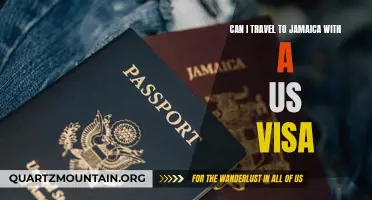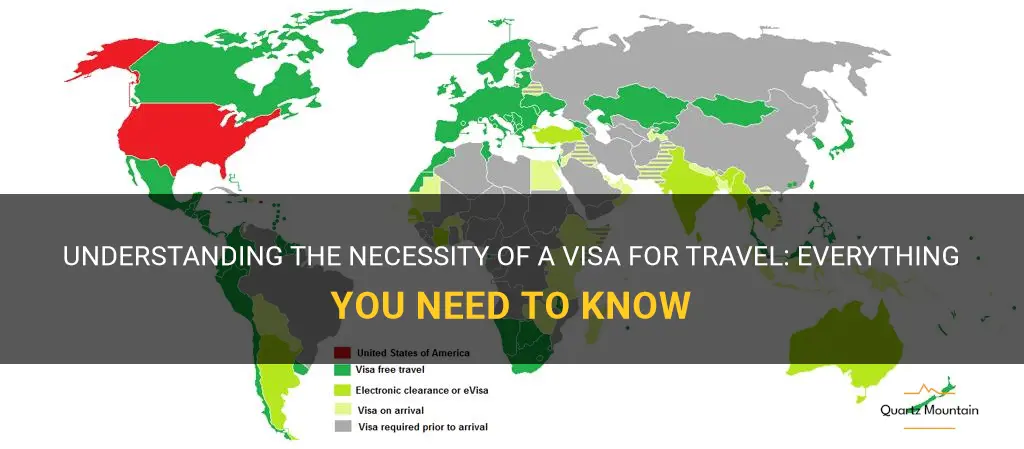
Travelling is often seen as a way to explore new cultures, experience unforgettable adventures, and broaden one's horizons. However, as much as we may dream of spontaneously jetting off to far-flung destinations, the reality is that international travel requires careful planning, including obtaining a necessary visa. Understanding the necessity of a visa for travel is crucial for globetrotters, and this comprehensive guide aims to shed light on everything you need to know about this vital document. From demystifying the visa application process to clarifying different types of visas and highlighting important dos and don'ts, this article will equip you with the knowledge you need to ensure smooth entry into your dream destination. So, pack your bags and delve into this illuminating exploration of the world of visas!
What You'll Learn
- When is a visa required for travel to other countries?
- How can I determine if I need a visa for a specific country?
- What types of visas are there and when do I need each type?
- Are there any countries that do not require a visa for travel?
- What are the consequences of traveling without a visa when one is required?

When is a visa required for travel to other countries?
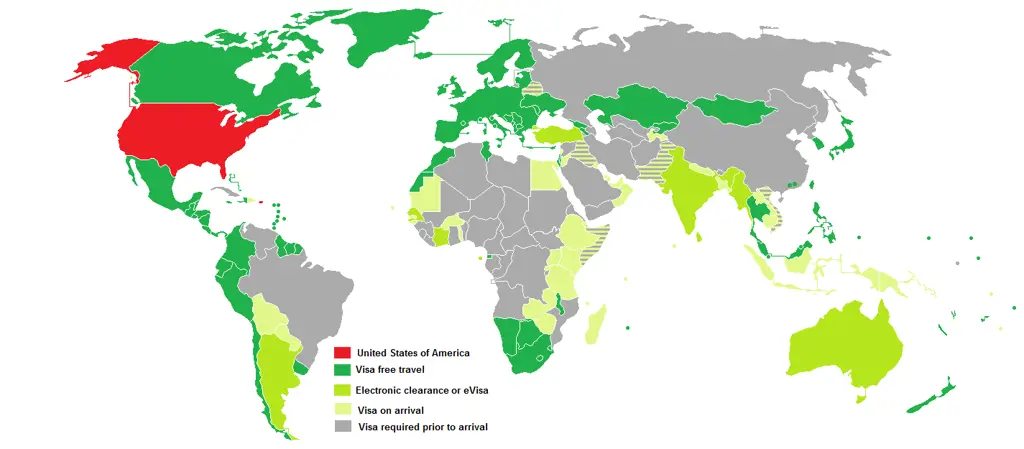
Traveling to other countries can be an exciting and enriching experience. However, before embarking on your journey, it is important to understand when a visa is required for travel to other countries. A visa is an official document issued by a country's government, granting permission for a person to enter, stay, or transit through their territory. Visa requirements vary from country to country and depend on several factors, such as the traveler's nationality, purpose of visit, and length of stay.
The first step in determining whether you need a visa is to identify your destination country. Each country has its own visa policies, which can be found on the official website of its embassy or consulate. These policies will outline the specific requirements for obtaining a visa, including any necessary documents and fees.
In general, visas are required for international travel when you are visiting a country other than your own. However, some countries have visa exemptions or visa waiver programs in place, which allow citizens of certain countries to enter without a visa for a specified period of time. For example, citizens of the United States can travel to Canada or Mexico for tourism or business purposes for up to 180 days without a visa.
The purpose of your visit is another important factor in determining whether a visa is required. Different types of visas may be required depending on whether you are traveling for tourism, business, education, or employment. Some countries may also require a visa for certain activities, such as attending conferences or participating in cultural exchange programs. It is important to carefully review the visa requirements for your specific purpose of travel to ensure compliance with the regulations of the destination country.
The length of your stay is also a key consideration when determining whether a visa is required. Many countries have specific visa categories based on the duration of stay, such as short-stay or tourist visas for stays of less than 90 days, or long-term visas for stays exceeding 90 days. It is important to determine the appropriate visa category for your intended length of stay and ensure that you apply for the correct visa type.
To illustrate the visa requirements for travel to other countries, let's consider an example. If you are a citizen of the United Kingdom planning to travel to China for tourism purposes, you will need to apply for a tourist visa before your trip. This would involve submitting an application form, along with supporting documents such as a valid passport, travel itinerary, and proof of accommodation. You would also need to pay the visa fee and may be required to attend an interview at the Chinese embassy or consulate. Once your visa is approved, you can travel to China and enjoy your vacation without any issues.
In conclusion, the requirement for a visa when traveling to other countries depends on various factors, such as nationality, purpose of visit, and length of stay. It is essential to research and understand the visa requirements of your destination country well in advance of your trip. This will ensure that you have the necessary documentation and comply with the regulations, allowing you to have a smooth and hassle-free travel experience.
Is it Possible to Travel on a U Visa? Exploring the Options and Limitations
You may want to see also

How can I determine if I need a visa for a specific country?

If you are planning a trip to a foreign country, one of the first things you need to determine is whether or not you need a visa. A visa is an official document issued by a foreign country that allows you to enter and stay in that country for a specific period of time. It is important to understand the visa requirements of the country you are visiting to avoid any issues or complications during your travels. Here are some steps you can take to determine if you need a visa for a specific country:
- Research the country's visa requirements: Start by researching the visa requirements for the country you plan to visit. You can find this information on the embassy or consulate website of the country you are traveling to. Look for information on whether or not your country is included in the list of visa-exempt countries or if you need to obtain a visa before your trip.
- Check the purpose of your visit: The purpose of your visit may determine the type of visa you need. Countries usually have different visa categories such as tourist, business, student, or work visas. Determine the purpose of your visit and check if you require a specific type of visa for that purpose.
- Determine the length of stay: The duration of your stay in a foreign country can also affect the visa requirement. Some countries allow visa-free entry for a specific number of days or weeks, while others may require a visa regardless of the length of stay. Check the maximum duration of stay allowed without a visa and make sure it is in line with your travel plans.
- Consider visa-free agreements: Some countries have agreements that allow citizens of certain countries to travel without a visa or obtain a visa on arrival. These agreements may vary depending on the country of citizenship. Check if your country has any visa-free agreements with the country you plan to visit.
- Consult with the embassy or consulate: If you are still unsure whether you need a visa for a specific country, it is best to consult with the embassy or consulate of that country. They can provide you with accurate and up-to-date information regarding the visa requirements for your trip. You can contact them via email or phone to inquire about the specific details of your situation.
It is important to note that visa requirements can change at any time, so it is always a good idea to double-check the information shortly before your trip. Additionally, make sure to apply for a visa well in advance to avoid any last-minute complications or delays. By following these steps and conducting thorough research, you can determine if you need a visa for a specific country and plan your trip accordingly.
Where Can I Travel with an F1 Visa? A Guide for International Students
You may want to see also

What types of visas are there and when do I need each type?
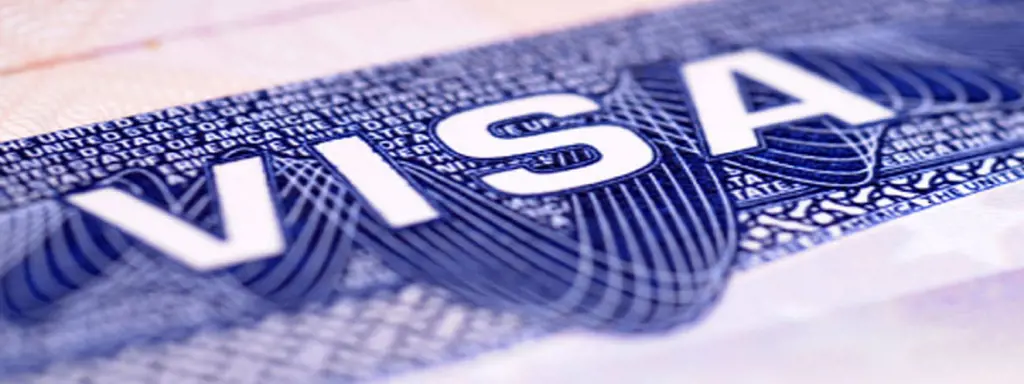
When traveling to another country, it's important to understand the different types of visas available and which one is appropriate for your purpose of travel. A visa is an official document issued by a country's government that allows an individual to enter, stay, or leave that country for a specific period of time and for a specific purpose. Each country has its own visa requirements and categories, so it's essential to research and understand the specific requirements for the country you plan to visit.
Here are some common types of visas and when you may need each type:
Tourist Visa:
A tourist visa is issued to individuals who plan to travel for leisure or tourism purposes. It typically allows the holder to stay in the country for a short period, ranging from a few weeks to a few months. Tourist visas may have restrictions on certain activities, such as working or studying, and may require proof of sufficient funds and a return ticket.
Business Visa:
A business visa is intended for individuals who plan to visit a country for business-related purposes, such as attending conferences, meetings, or negotiations. It allows the holder to engage in business activities but not to work in the country. Business visas may require an invitation letter from a local business or organization, proof of financial stability, and information about the purpose of the trip.
Student Visa:
A student visa is necessary for individuals planning to study abroad. It allows the holder to stay in the country for the duration of their academic program. Student visas often require proof of enrollment at an accredited educational institution, proof of financial means to support oneself during the stay, and sometimes proof of health insurance.
Work Visa:
A work visa or work permit is required for individuals who wish to work in a foreign country. It allows the holder to work for a specified employer or engage in self-employment. Work visas generally require a job offer from a company in the host country, proof of qualifications or skills, and sometimes a labor market test to ensure that the job cannot be filled by a local candidate.
Transit Visa:
A transit visa is necessary for individuals who are passing through a country en route to another destination. It allows the holder to stay in the country for a short period, usually not exceeding 48 to 72 hours. Transit visas are often required when changing flights in a country that requires a visa for travelers from your point of origin.
Spouse or Family Visa:
A spouse or family visa allows individuals to join their spouse or family members who are already residing in a foreign country. These visas are typically granted to immediate family members, such as spouses, children, or parents. The requirements for a spouse or family visa may vary depending on the specific circumstances, but they generally include proof of the relationship and sometimes proof of financial support.
It's important to note that visa requirements and categories can vary greatly from country to country. It's crucial to carefully research the specific visa requirements for your destination country and allow sufficient time for the visa application process. Failing to obtain the correct visa or entering a country on the wrong visa can result in denied entry, legal consequences, or deportation. It's always advisable to consult with the embassy or consulate of your destination country for accurate and up-to-date information regarding visa requirements and processes.
In conclusion, understanding the different types of visas and when you need each type is essential for hassle-free travel. Whether you're traveling for tourism, business, education, or family purposes, it's crucial to research and apply for the correct visa well in advance of your planned trip. By following the specific requirements and procedures for each type of visa, you can ensure a smooth and legal entry into your destination country.
Understanding the Importance of a Travel Visa
You may want to see also

Are there any countries that do not require a visa for travel?

Traveling to another country usually involves obtaining a visa, which is a document that allows you to enter and stay in that country for a specific period of time. However, there are some countries that have agreements with certain nations that waive the requirement for a visa. This means that individuals from those countries can travel to these destinations without obtaining a visa beforehand.
Visa-free travel can make the journey much more convenient and cost-effective, as it eliminates the need to go through the visa application process, which can be time-consuming and expensive. It allows travelers to simply book their flights, pack their bags, and explore a new country without any additional bureaucratic hurdles.
The number of countries that do not require a visa depends on your nationality. Citizens of some countries can enjoy visa-free travel to a large number of destinations, while others have limited options. There are also countries that have visa-free agreements with certain nationalities for short-term visits, but still require a visa for longer stays or other purposes, such as work or study.
For example, citizens of the European Union (EU) can travel within the EU without a visa, as well as to a number of non-EU countries, such as the United States, Canada, Australia, and New Zealand, among others. Similarly, citizens of the United States can travel to many countries without a visa, including popular tourist destinations like Mexico, Thailand, Singapore, and Japan.
However, it's important to note that even if a country allows visa-free travel, there may still be additional requirements upon arrival, such as proof of sufficient funds, valid travel documents, or a return ticket. It's always a good idea to check the specific entry requirements for your nationality before traveling.
Additionally, visa-free travel is subject to change and can vary depending on the political climate, security concerns, and diplomatic relations between countries. It's important to stay updated on travel advisories and check with the embassy or consulate of the destination country for the most up-to-date information.
In some cases, countries may offer visa-free travel for a limited period of time as a way to promote tourism and attract foreign visitors. For example, some Caribbean islands offer visa-free access for a certain number of days to citizens of certain countries. This allows travelers to explore the beautiful beaches and vibrant culture of these destinations without the hassle of obtaining a visa.
In conclusion, while most countries require a visa for travel, there are some that have agreements in place with certain nationalities, allowing for visa-free travel. The availability of visa-free travel depends on your nationality and the destination country's regulations. It's important to research and stay informed about the specific entry requirements for your nationality before planning your trip. Happy travels!
Tips for Traveling to the Bahamas on a B1/B2 Visa
You may want to see also

What are the consequences of traveling without a visa when one is required?
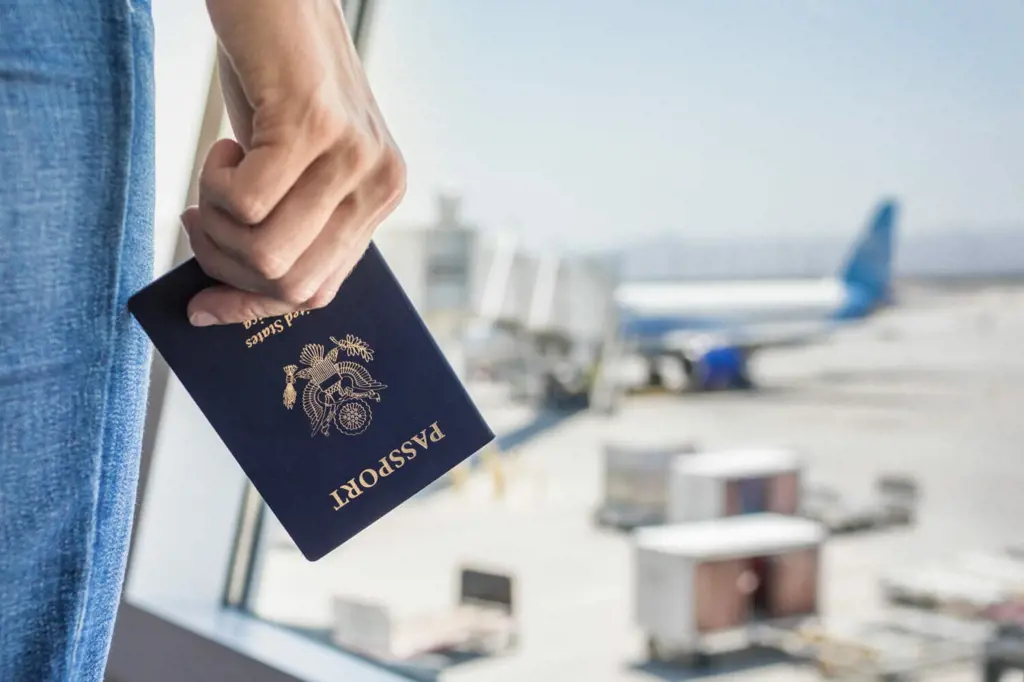
Traveling without a visa can have serious consequences, both immediate and long-term. Visa requirements are put in place by countries to regulate who enters their borders and for how long. By circumventing these requirements, travelers run the risk of facing legal and logistical difficulties. In this article, we will explore the consequences of traveling without a visa when one is required.
Immediate consequences often include being denied entry into the country or being detained by immigration authorities. Border agents have the responsibility to check travelers' documents and verify their eligibility to enter a country. If a traveler does not possess a valid visa, they may be turned away at the border or detained until their situation is resolved.
In some cases, travelers may be subjected to fines or other penalties for traveling without a visa. These fines can vary depending on the country and the circumstances, but they can be substantial. Additionally, travelers may also face other legal consequences, such as being banned from reentering the country for a certain period or facing criminal charges for immigration violations.
Beyond the immediate consequences, traveling without a visa can have long-term implications. Immigration violations can have a negative impact on future travel plans, as they can be recorded in immigration databases. These records can be accessed by other countries, making it harder for the individual to obtain visas in the future.
Furthermore, if a traveler is found to have violated visa requirements, it can affect their ability to apply for residency or citizenship in the future. Many countries have strict requirements for obtaining residency or citizenship, and a history of immigration violations can be seen as a red flag in these applications.
Traveling without a visa can also have practical consequences. Without a visa, travelers may not be able to access certain services or benefits in the country they are visiting. For example, they may not be able to open a bank account, obtain healthcare, or secure employment legally. This can lead to difficulties and potential vulnerability in the host country.
In some cases, traveling without a visa can damage diplomatic relations between countries. When individuals consistently violate visa requirements, it can strain bilateral relationships and lead to stricter visa policies for citizens of both countries involved. This can cause complications for other travelers who do abide by visa regulations and can harm cultural and economic exchanges between nations.
To illustrate the consequences of traveling without a visa, let's consider an example. Suppose an individual decides to travel to a foreign country without obtaining the required visa. Upon arrival, they are denied entry and sent back to their home country. In addition to the cost of their airfare, they may also be required to pay for the immediate return ticket. This unexpected expense can be financially burdensome.
Furthermore, the individual may now have a record of immigration violation, making it more difficult for them to obtain visas for future travel. They may miss out on opportunities to explore new countries, study abroad, or attend international conferences. The consequences of their choice to travel without a visa can have long-term effects on their personal and professional life.
In conclusion, traveling without a visa when one is required can have serious consequences. These consequences can include being denied entry, facing immediate fines or penalties, damaging future travel plans, affecting residency or citizenship applications, experiencing practical difficulties, straining bilateral relations, and incurring unexpected expenses. It is crucial to abide by visa requirements to ensure a smooth and legal travel experience.
Can I Travel with an Expired Visa?
You may want to see also
Frequently asked questions
A visa is typically required for travel when visiting a foreign country that has specific entry requirements. These requirements can vary depending on the destination country, the purpose of travel, and the traveler's nationality.
To determine if you need a visa for a specific country, you can check the embassy or consulate website of that country. They will usually provide information on visa requirements and application processes. Additionally, you can consult with a travel agent or use online visa services that provide information on visa requirements for different countries.
Some countries do allow for visas to be obtained upon arrival at the airport or border crossing. However, this option is not available for all nationalities and may have certain limitations, such as a maximum duration of stay. It is always recommended to check the visa requirements and application process for your specific destination well in advance of your travel dates to ensure a smooth entry into the country.






